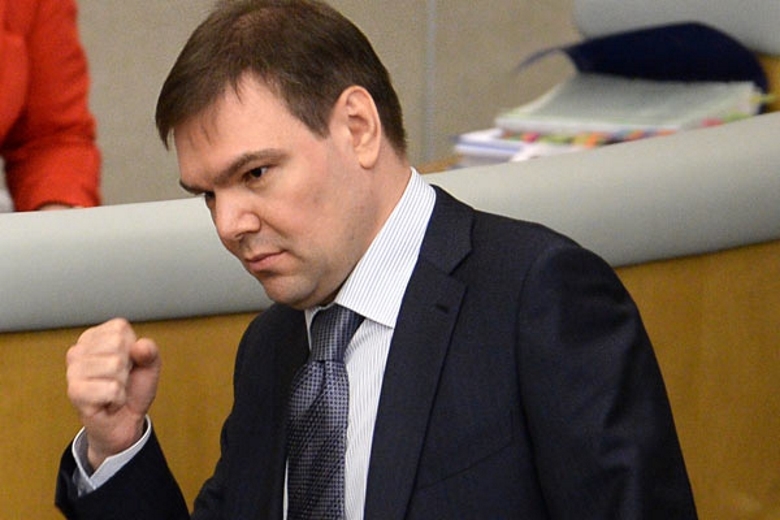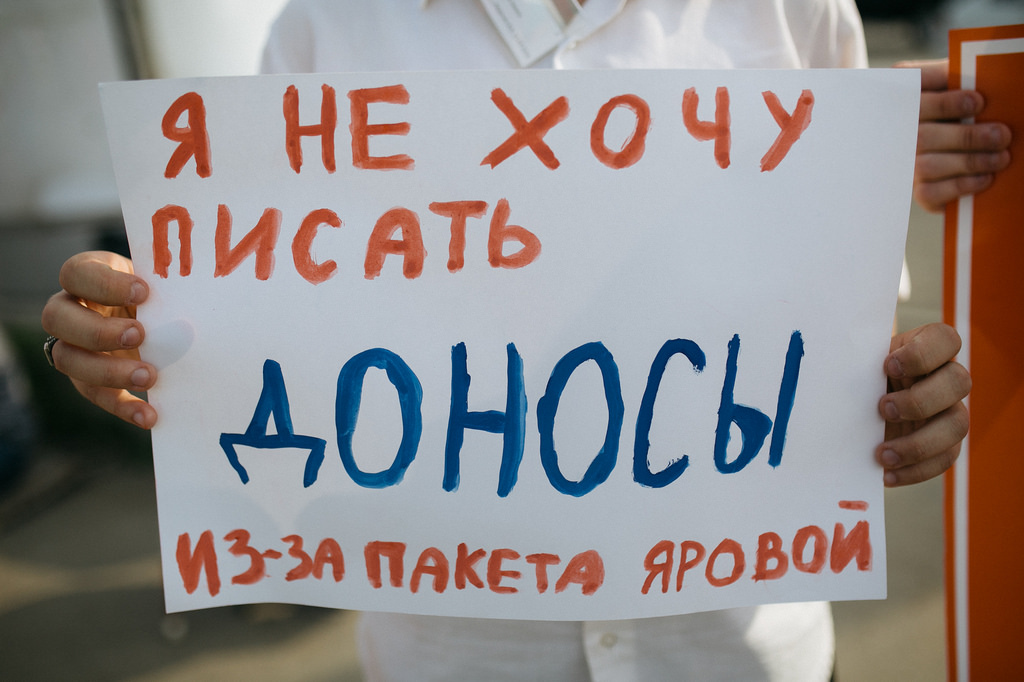The Ministry of Communications did not support the petition for the cancellation of the Yarovaya-Ozerov package. The law will be amended

Deputy Minister of Communications Alexey Volin
Yesterday at the meeting of the expert group on the consideration of the petition on the site of the ROI , the Ministry of Communications and other agencies decided not to support the initiative to abolish the package of antiterrorist laws Yarovaya-Ozerova, reports TASS .
"... our recommendation from the expert council is as follows: the initiative to repeal the package of antiterrorist laws is not supported and rejected, but at the same time to give recommendations to the government, the State Duma and the ministries and departments related to the implementation of this law," said Deputy Communications Minister Alexei Volin
')
After signing the document in the summer of 2016, a petition was filed on the ROI website for cancellation of the package of anti-terrorism laws by Irina Yarovaya and Viktor Ozerov. The initiative has gained more than 100,000 signatures, which automatically requires its official consideration by the authorities. Work with the petition launched the process of revising the norms of the package of laws of Yarovo-Ozerov, for which representatives of business, such as telecom operators and IT companies, actively supported not only society.
In addition to the expert group meeting, yesterday, consultations were held between the Ministry of Communications and representatives of law enforcement agencies, which led to an agreement to soften the norms of the law. Volin said that the required storage types of traffic have been revised. Thus, telecom operators and distributors of information will not be obliged to store the most "heavy" types of data generated when watching videos, IP-TV or when downloading torrent files.
“We have had, in our opinion, a rather constructive dialogue with our colleagues from the power bloc, because today we have agreements and understanding that information volumes can be reduced by about 10 times,” said at the meeting Volin
“The point is that the redundant information includes Internet video, IP-TV, torrents and a number of other very difficult to store information resources,” said the deputy minister.
In addition, the Ministry of Communications and Mass Media reached an agreement, within which the terms of mandatory data storage will increase in stages from the moment the law entered into force on July 1, 2018.
“The second thing about which an agreement was reached, and to which we also received consent from colleagues from law enforcement agencies, this is the gradual deepening of information storage. Because today this information is stored 12 hours. We have an understanding that the transition from 12 hours to 6 months can be done gradually, ”said Volin.
The package of antiterrorist laws of Yarovaya-Ozerova obliges communication operators to keep information on the facts of receiving, transmitting, delivering and processing data for three years. Another six months - all transmitted traffic. At the same time, the authors of the draft law ignored the opinion of independent experts and business representatives that the law would not only not bring actual benefits, but also put the country's IT sector “on its knees” financially: the estimated costs of building the necessary infrastructure to comply with the standards of the Spring Ozerov in its current form are very heavy for the sector.
Experts also point out that some provisions of the Yarovaya-Ozerova package are technically impractical (for example, the transfer of encryption keys), and the rapid growth in the popularity of the HTTPS protocol and other methods of protecting information will lead to the fact that within a few years 90% of Internet traffic will be encrypted. At the same time, there are simply no effective methods for decoding it in similar volumes, as well as technical means for implementing such a project. Forced substitution of certificates for the “necessary” will compromise the entire RuNet entirely and lead to the extermination of such types of services and services on the territory of Russia, such as foreign payment systems and Internet banking.
However, all this does not stop officials from the desire to "regulate" the IT-sphere and cyberspace. In this case, all costs and responsibilities will fall on the shoulders of telecom operators and IT companies, and they, in turn, for the sake of their own survival, will shift the financial burden to end users. The impact of the Yarovo-Ozerov package can be so devastating that its entry into force with the consequent increase in communication tariffs will slow down the pace of a country's economic development.

Leonid Levin
Leonid Levin, chairman of the State Duma Committee on Information Policy, said on Thursday that the need to ensure the security of the state and information systems and the protection of citizens from terrorist threats is beyond question. Experts also note that the consolidation and collection of such an array of data in one place will lead to the threat of hacker attacks on the repository, followed by a massive leak of private information.
According to Levin, the failure to adopt the Yarovaya-Ozerov law is not due to the fact that it is redundant and technically impracticable, but because "the relevant discussions were not held (with society and industry)." According to the deputy, yesterday’s discussion of the petition was "another fact," which "confirms the rapidity at the adoption of the relevant amendments."
For the requirements of the business and IT sector to reduce the amount of information necessary for storing information from society, the fact that the Yarovo-Ozerov antiterrorist package is not only the creation of new data warehouses eludes. In addition to new requirements for telecom operators and Internet projects, the law expands the powers of law enforcement agencies, strengthens regulation in the field of religious missionary activity and sets new requirements for forwarding carriers and postal service operators.

"Among the innovations are increasing the term for a number of criminal articles, the introduction of additional reasons for the ban on exit and entry, increasing the retention of information by mobile operators on the facts of reception, transmission and content of voice information and messages (from six months to three years), allowing investigators to receive information from electronic correspondence, deprivation of citizenship (removed from the law) for those who committed terrorist and extremist actions, the introduction of the notion of an “act of international terrorism” and the introduction of a criminal responsibility for misrepresentation ”, - provides information about the package of Spring-Ozerov on Wikipedia .
In addition to increasing the financial burden on businesses and the public through an increase in tariffs, the Yarovo-Ozerov law package significantly limits civil liberties and tightens the penal code. It can also lead to a number of serious inconveniences, for example, to the mandatory opening and checking of all mailings.
Source: https://habr.com/ru/post/357242/
All Articles